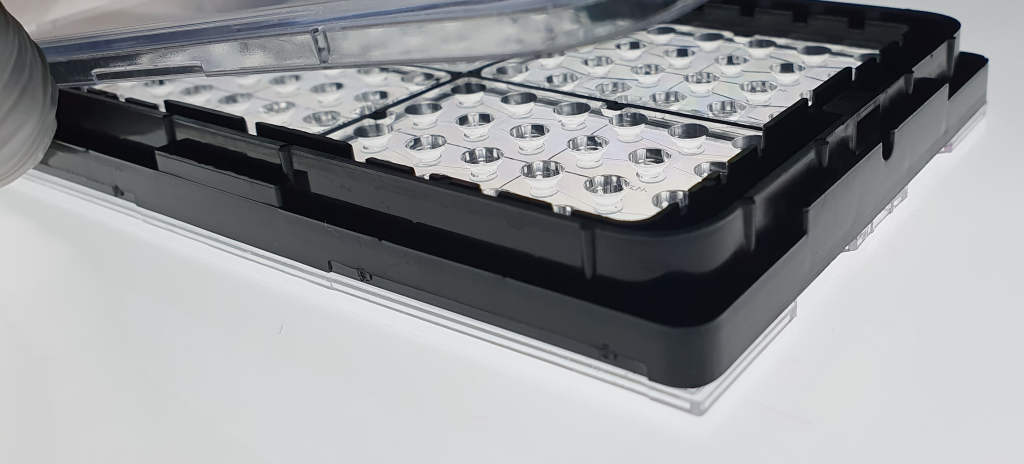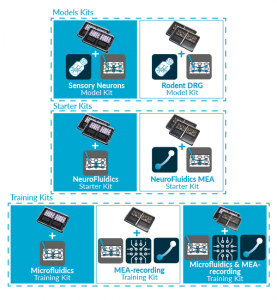
NETRI mis en avant dans Les Echos
L’article paru dans Les Echos met en avant NETRI et ses projets de développement.

L’article paru dans Les Echos met en avant NETRI et ses projets de développement.
Abstract Microfluidic neuro-engineering design rules have been widely explored to create in vitro neural networks with the objective to replicate physiologically relevant structures of the brain. Several neurofluidic strategies have been reported to study the connectivity of neurons, either within a population or between two separated populations, through the control of the directionality of their neuronal projections. Yet, the in vitro regulation of the growth kinetics of those projections remains challenging. Here, we describe a new neurofluidic chip with a triangular design that allows the accurate monitoring of neurite growth kinetics in a neuronal culture. This device permits to measure the maximum achievable length of projecting neurites over time and to report variations in neurite length under several conditions. Our results show that, by applying positive or negative hydrostatic pressure to primary rat hippocampal neurons, neurite growth kinetics can be tuned. This work presents a pioneering approach for the precise characterization of neurite length dynamics within an in vitro minimalistic environment.
Abstract Compartmentalized microfluidic chips have demonstrated tremendous potential to create in vitro minimalistic environments for the reproduction of the neural circuitry of the brain. Although the protocol for seeding neural soma in these devices is well known and has been widely used in myriad studies, the accurate control of the number of neurites passing through the microchannels remains challenging. However, the regulation of axonal density among different groups of neurons is still a requirement to assess the inherent structural connectivity between neuronal populations. In this work, we report the effect of microchannel patterning strategies on the modulation of neuronal connectivity by applying dimensional modifications on microchannel-connected microfluidic chambers. Our results show that those strategies can modulate the direction and the number of neuronal projections of passage, therefore regulating the strength of the structural connections between two populations of neurons. With this approach, we provide innovative microfluidic design rules for the engineering of in vitro physiologically relevant neural networks.
NETRI is honored to receive the Global Health Pharma’s Biotechnology Award 2020.
NETRI offers free samples for research teams that are working on SRAS-CoV-2 interactions with the central/peripheral nervous system. Neurofluidic™ chips allow fluid isolation of neural types to study the spread of the virus through synaptic chambers. Contact us ASAP! Coronavirus humains respiratoires neuro-invasifs et neurotropes : agents neurovirulents potentiels. Marc Desforges, Alain Le Coupanec, Élodie Brison, Mathieu Meessen-Pinard, Pierre J. Talbot. Virologie. 2014;18(1):5-16. Doi:10.1684/vir.2014.0544
Press ReleaseMarch 25th, 2020 Breackthrough unlocks progress in brain-on-a-chip technology Massively accelerated image processing supports development of novel treatments for neurological conditions Lyon, March 25, 2020 – Cambridge Consultants and Neuro Engineering Technologies Research Institute (NETRI) announce a breakthrough in precision imaging of brain activity. Working with NETRI’s brain-on-a-chip technology and lensless imaging approach that detects the activity of neurons in brain tissue, Cambridge Consultants was able to accelerate the processing of individual images by over three orders of magnitude, moving from about 20 minutes to process an image to just hundreds of milliseconds. This step-change in speed opens up radical new possibilities, including real-time processing of neural activity and mimicking of neural activity on engineered platforms, supporting the development of novel treatments for conditions such as Parkinson’s and Alzheimer’s diseases. Organ-on-a-chip is an emerging and highly promising area of biomedical research. The technology involves the ex-vivo (outside of the body) simulation of organ function on a chip. The ultimate promise of such technologies is to greatly reduce the time and cost of testing new therapies for safety and efficacy. Brain-on-a-chip technologies seek to apply this approach to the neural circuitry of the brain, the most complex organ in the human body. French startup NETRI creates disruptive technologies for brain-on-a-chip applications in neuroscience. Its focus is on ex-vivo replication of human neural circuits in order to understand how neurological disorders, treatments and chemicals affect the brain. NETRI uses a combination of brain-on-a-chip technology and lensless microscopy to record the activity of millions of connected neurons, mimicking the neural circuits implicated in neurological disorders. However, by detecting something as complex as neural activity, the approach generates an enormous amount of data, requiring many hours of computation effort in order to fully reconstruct the spatio-temporal map of neuron communication. The imaging system runs at approximately 1,000 frames per second, and the baseline algorithm took an average of 1,090 seconds – 18 minutes – to process a single image on a powerful desktop PC. Without improvement, a single second of recording can take 12 days to process. Recognizing its world-class expertise in medical imaging and high-performance computation, NETRI approached Cambridge Consultants to address this bottleneck, challenging the company to develop a radical algorithm acceleration. A scientific imaging team was set to work within the company’s Data Lab, an on-site facility with state-of-the-art compute infrastructure, allowing rapid exploration of data and compute-heavy approaches, such as high-definition imaging and deep learning. Cambridge Consultants selected the NVIDIA DGX POD architecture for their AI infrastructure, deploying the NetApp ONTAP AI solution that combines NVIDIA DGX-1™ with NetApp ONTAP storage and network fabric. Through a series of optimizations, the team was able to show that the NVIDIA DGX-1 system delivers the AI supercomputing power required to process a frame in an average of 0.3 seconds, around 3,000 times quicker than the original approach. This acceleration was achieved through a series of optimizations including the design and application of mathematical and algorithmic improvements, leveraging NumPY GPU-accelerated with RAPIDS (CuPy), and exploiting the sheer power of the DGX-1 system. The combined result enables NETRI to completely reimagine their approach and to set their sights on the most radical possibilities, including developing a fully scalable and real-time medical service for hospitals and pharmaceutical industries to perform both in-vitro diagnostics and personalized treatment for every patient suffering from a neurological condition. Sally Epstein, Head of Strategic Technology at Cambridge Consultants, commented: “Lensless imaging replaces traditional optics with computation, creating a new set of optimization challenges that our team was excited to address. We’re proud to be at the leading-edge of developments in brain-on-a-chip technology and neural imaging, at the point where radical improvements can be unlocked by those with the right combination of vision, experience and compute power.” Thibault Honegger, Chief Scientific Officer, President & co-founder of NETRI, commented: “By combining the expertise of Cambridge Consultants with NVIDIA-based computational power, the real-time processing of neural communications becomes possible. This can mark a paradigm shift in assessing the functional aspects of in-vitro neural networks. With this level of resolution, we will be able to accurately measure the “wellness” of the network, in relation to neurological conditions and potential recovery.” About Cambridge ConsultantsCambridge Consultants develops breakthrough products, creates and licenses intellectual property, and provides business consultancy in technology-critical issues for clients worldwide. For more than 50 years, the company has been helping its clients turn business opportunities into commercial successes, whether they are launching first-to-market products, entering new markets or expanding existing markets through the introduction of new technologies. With a team of more than 850 staff, including engineers, scientists, mathematicians and designers, in offices in Cambridge (UK), Boston (USA), Tokyo and Singapore, Cambridge Consultants offers solutions across a diverse range of industries including medical technology, industrial and consumer products, digital health, energy and wireless communications.For further information, visit: www.cambridgeconsultants.com Cambridge Consultants is part of Altran. Altran is the undisputed world leader in engineering and R&D services. The Group offers its customers a unique value proposition to meet their transformation and innovation challenges. Altran supports its customers, from concept to industrialization, to develop the products and services of tomorrow. Altran has been working for more than 35 years with major players in many sectors: Automotive, Aeronautics, Space, Defense & Naval, Rail, Infrastructure & Transport, Industry & Consumer Products, Life Sciences, Communications, Semiconductor & Electronics, Software & Internet, Finance & Public Sector. In 2019, Capgemini, and Altran announced a merger project in the context of a friendly tender offer to create a global leader in “Intelligent Industry”. Altran generated €3.2 billion in revenue in 2019, with more than 50,000 employees in more than 30 countries. www.altran.com About NETRINETRI has unique expertise and technologies in microfluidics engineering. NETRI designs, fabricates and exploits 3D microfluidics chips dedicated to neuroscience, aiming at understanding the structural and functional mechanistic of neural circuits, neurological disorders or potential novel treatments. Using a multi-compartments approach, we can reproduce in vitro neural networks of every complexity up to connectome-on-chip. Using rodent or iPSCs cells, physiologically
Discover our new exclusive package
organs-on-chip kits and all our
neuro-organs-on-chip devices.

ORGANS-ON-CHIP KITS
Quickly and easily adopt organs-on-chip
into users’ research

